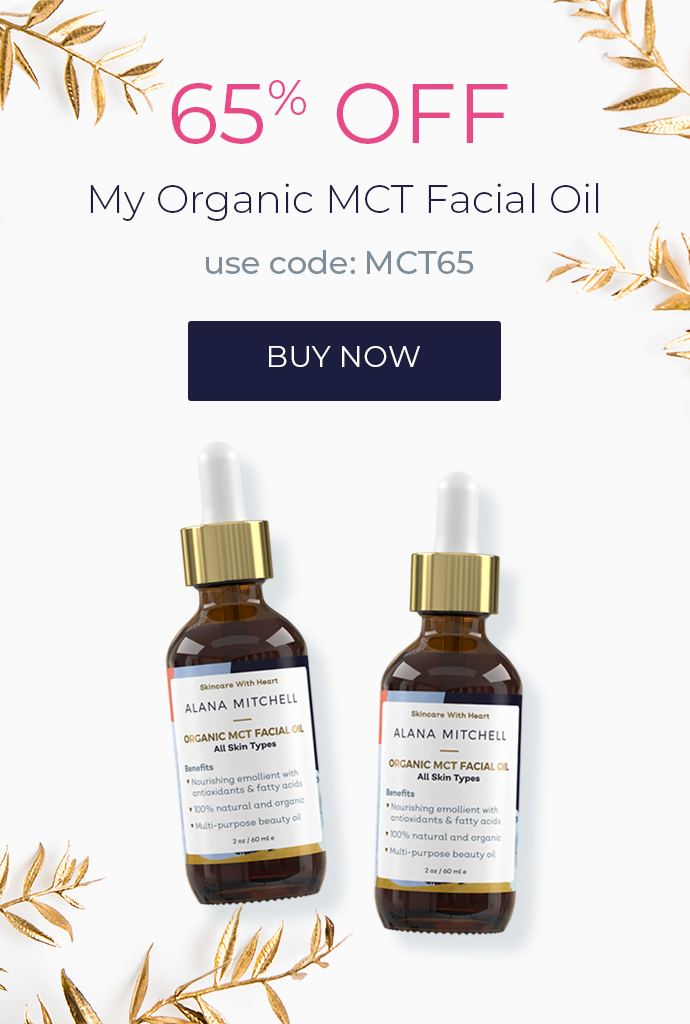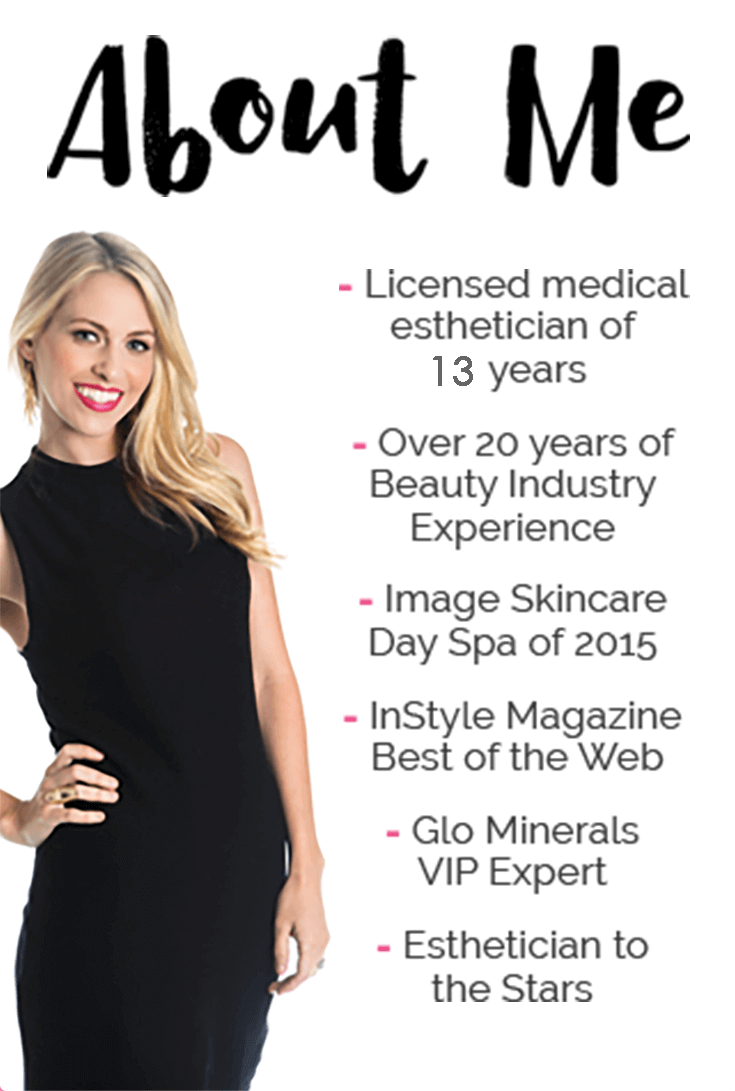What Should You Be Using In Your Skin Care Routine?
Take my quiz and get personalized recommendations from a
licensed esthetician!
Is Your Skin Prone to Allergic Reactions? You NEED to Read This
If you have sensitive skin, you know how frustrating it can be.
As much as you want to try new products, it’s not always safe to do so.
“What if I break out?” is a question that’s often asked.
You may have heard the term “hypoallergenic skincare” being thrown around.
You may figure that these products are a safe middle ground.
But not so fast.
There’s more to this than meets the eye, which I’ll talk about in a bit.

You’re not alone!
Many people attribute this claim to reasons ranging from skin type to dermatological disorders for their declaration of sensitivity in the skin.
If the truth behind “hypoallergenic” beauty confuses you, I completely understand.
Through my experience as an esthetician, I’ve spent years navigating through a myriad of beauty and skincare products to ensure safety.
I’m also familiar with plenty of natural skincare products, which are less likely to cause a reaction.
So if you have sensitive skin or are prone to allergic reactions, I’ve got plenty of solutions for you.
But first, let’s learn a little more.
There’s a lot to remember and learn, and I hope this info works as an easy-to-understand guide to choosing safe products that won’t irritate your skin.

Defining “Hypoallergenic”
Well, when a product is packaged as “hypoallergenic,” it doesn’t mean it’s foolproof against allergies.
This is what many people think it means.
It also doesn’t mean it’s guaranteed to be gentler on your skin.
What does it mean, then?
“Hypoallergenic” just means it’s less likely to cause allergic reactions in most people.
See the difference?
Allergies And Your Skin
One of the most common skin reactions to beauty products is called contact dermatitis.
According to the American Academy of Allergy Asthma & Immunology, this refers to an inflammation of the skin resulting from direct contact with a substance.
There are two different types.
Irritant contact dermatitis is the most common and is caused when substances such as chemicals or solvents irritate the skin.
The exposure produces red, often more painful, patches on the involved skin areas.
Allergic contact dermatitis occurs when a substance triggers an immune response.
Common culprits are nickel, latex, perfumes, dyes, topical medications, and cosmetics.
On the other hand, atopic dermatitis (a type of eczema) occurs as a result of genetic predisposition.
Signs of contact dermatitis include:
- Red rash, bumps, or a burn-like rash on the skin
- Itchy, painful, or burning skin
- Crusting or oozing
- Blisters and draining fluid
As for sensitive skin, whether you’re trying a new product, generally overheated, or susceptible to razor bumps after shaving, you probably have a reaction to just about anything.
A wide array of triggers can contribute to sensitivity.
Genetics, environment, weather, hormones, hard water, and various household products can all be at the root of reactions in skin that's prone to sensitivity.
The environmental factor most strongly associated with sensitive skin was stress.
Signs of sensitive skin include:
- Reactive skin in the form of pustules, skin bumps, or skin erosions
- Dryness, flakiness, or peeling
- Cracked or scaly skin
- Redness and irritation
- Itchiness
- Stinging or burning
- Prone to breakouts
- Swelling, burning, or tenderness
Personally, I treat sensitive skin and allergy-prone skin the same way - because those with sensitive skin often experience allergic reactions.
Where The FDA Stands On “Hypoallergenic”
As of now, there are no federal standards or definitions governing the use of the term.
Which boils down to the fact that any particular company who wants to use it to influence consumers can do just that.
Manufacturers of cosmetics labeled as “hypoallergenic” are not required to submit substantiation of their claims to the FDA.
You’re probably asking yourself, “If the U.S. government doesn’t have standards that products must meet in order to put 'hypoallergenic' on the label, how do we know what we’re really getting?”
Unfortunately, it’s impossible to guarantee that any skincare or beauty products won’t cause an allergic reaction.

Buzzwords to Look Out For
Hypoallergenic
This isn’t a guarantee something won’t cause an allergic reaction.
Its definition varies widely, and you should still take precautions with these products if you have any reservations.
Unscented
You may think a product marketed as “unscented” won’t have a detectable odor.
But it may contain fragrances to mask its natural scent.
Since fragrance is the most common allergen in skincare products, be on the lookout for things labeled as “fragrance-free” instead.
Natural
It’s no secret that products marketed as “natural” are a big hit lately.
Much like with “hypoallergenic,” there is no FDA standard for the term “natural.”
This means any brand can use it however it wants, which can be misleading to consumers.
Just because a product may contain a few essential oils doesn’t mean there aren’t chemicals or synthetic ingredients, so use caution and do your research before purchasing.
Non-toxic
This is a big buzzword because, really, who would actually choose to put toxic ingredients on their body?
Well, it’s more complicated than that.
A “toxin” is considered to be an antigenic poison or a venom derived from a plant or animal.
Toxic products are defined as harmful and can lead to serious health issues in extreme cases.
But fear-mongering in advertising is incredibly prevalent in the beauty industry - trust me, I know.
I’ve spent a lot of time determining the safety of many beauty products.
But can I just be honest?
Toxins are a real thing, but it’s highly unlikely the chemicals found in your favorite facial cleanser aren’t going to seriously harm you.
Patch It Up
A “patch test” is a method used to determine whether a specific substance causes sensitivity or an allergic reaction on your skin.
If you have sensitive skin or are prone to allergies, I can’t stress enough how important a patch test is!
Here's how to do it: test the product on a small patch of skin, like behind your ear or on the back of your wrist, and wait 24-48 hours to see if you develop a reaction.
If you don't notice any signs of irritation, you're good to go.
If your skin reacts angrily, don't use the product.
(If you've already purchased the full size, check out the return policy.)
Better to be safe than sorry. :)

Allergy-Friendly Ingredients
The most important thing you can do when choosing new cosmetics or skincare products is to pay attention.
Keep track of which products have caused allergic reactions in the past, and observe how products at the store are labeled.
For example, steering clear of parabens could be a good rule of thumb.
Remember, most of the time it's the fragrances, preservatives, or botanicals that will cause a skin reaction, even if you are using a product that's labeled as “hypoallergenic.”
Choose a product line with a SHORT list of ingredients.
The reason for this is that there will be fewer ingredients that your skin can potentially react to.
Things like shea butter, cocoa butter, coconut oil, and jojoba oil can minimize the risk of an allergic reaction to your skin.
Here are some of my favorite allergy-friendly ingredients that work well with sensitive skin!

- Safflower oil is a carrier oil that hydrates the skin.
- It’s great for preventing moisture loss in hair as well.
- Safflower oil is a favorite in natural skincare because it’s an alternative to synthetic emollients.
- Its anti-inflammatory properties make it beneficial for psoriasis, eczema, and acne.
- It also protects against pollution and toxins in the air, which can damage the skin.
- Safflower oil is also used in cooking and available in supplement form.

- Passion flower extract is full of nutrients that are good for the skin, including vitamins A and C, and essential fatty acids.
- Its known for protecting the skin against environmental stressors.
- Passion flower extract is great for keeping the skin looking firm and youthful.
- It reduces the appearance of fine lines and wrinkles and keeps the skin smooth and plump.
- It hydrates and moisturizes the skin without clogging pores, and it’s soothing and calming for dry, itchy, and irritated skin.

- Flaxseeds are the best sources of plant-based omega-3 fatty acids.
- These fatty acids help improve skin’s elasticity and texture.
- They smooth the skin and reduce the appearance of wrinkles by helping to repair skin cells, which also benefit skin’s overall health.
- Flaxseed oil is ideal for treating skin conditions, such as psoriasis and eczema, by reducing redness, itching, inflammation, and irritation.
- It's used in supplements to boost heart health, relieve constipation, and even prevent cancer.

- It helps protect the skin against external forces (i.e. cold/dry weather, wind), making it an excellent temporary anti-irritant.
- Allantoin helps to heal damaged skin and is even believed to stimulate new tissue growth.
- Skin is softened and soothed while cell regeneration is stimulated.

- Lemongrass essential oil is an excellent natural toner and astringent due to its antiseptic properties.
- It purifies pores for even and glowing skin.
- It is also a great ingredient for a DIY deodorant as it controls odor and has a pleasant fragrance.
- Lemongrass essential oil is beneficial to hair as it strengthens hair follicles and soothes an itchy or irritated scalp.
If you ever need to look up a specific ingredient, check out my skincare ingredient dictionary!
Finding The Right Makeup
“Hypoallergenic” isn’t limited to skincare products - it covers cosmetics, too!
Makeup that won’t irritate skin or trigger allergies usually contains few artificial ingredients.
Natural and organic products are usually free of the dyes, fragrance, alcohol, parabens, mercury, and talc most other products contain.
Those are all well-known skin irritants, and I recommend steering clear of them if you’re concerned.
I personally love, love, love mineral makeup and powder for facial cosmetics.
And remember: Free samples are your friend.
Don't be afraid to ask for them!
They're the simplest, most cost-effective way to figure out what works best for your skin.
Don’t forget to check the expiration date.
Just like food, cosmetics have a shelf life.
Makeup past the printed date will have a greater chance of causing an allergic reaction and will also be less effective.
And, don't forget to take off your makeup every time you wear it!!

Improvements In The Industry
Since there are no accepted tests, guidelines, restrictions, or rules of any kind when it comes to what “hypoallergenic” really means and how it can be marketed (scary!), it lies on the consumer to do the homework at this point in time.
I know - who has time for this?!
But hopefully, this won’t always be the case.
Hypoallergenic Claims, an article published in Chemical & Engineering News, cites that medical professionals call for regulation of the terms ‘hypoallergenic’ and ‘dermatologist recommended/tested’ on product labels.
For professionals in the skin and beauty industry like myself, this is a huge relief!
A step in the right direction for sure.
The researchers at Chemical & Engineering News tested 187 cosmetic products for 80 of the most common known allergens.
One finding became very apparent: there are too many skin care products that tote the “hypoallergenic,” “dermatologist recommended,” fragrance-free,” and “paraben-free” claims in a meaningless way.
In fact, 89 percent of the products contained at least one known problem allergen on their ingredient list, 63 percent contained two or more, and 11 percent contained five or more. Yikes!
Final Thoughts
A hypoallergenic label on a skincare product simply means that product is probably unlikely to cause an allergic reaction compared to products labeled otherwise.
But remember: it’s not a guarantee.
While hypoallergenic products contain fewer potential allergens or substances that trigger allergic reactions, the products are not allergy-proof.
It's impossible to guarantee that a product will never cause an allergic reaction because there are so many potential allergens and many people are allergic to different things, and their allergies are triggered by many variants.
When choosing products, just be mindful of ingredient lists and don’t take all the terms I mentioned above at face value.
It’s up to you to carefully read and consider the labels and ingredients in the products you choose to buy.
As always, do your research and feel free to use this blog as a guide during your next shopping trip!
If you have questions or concerns about your skin allergies or sensitivities, always consult with a dermatologist or licensed esthetician.
Beauties, do you struggle with skin sensitivities and/or allergies? What ingredients and products have worked for you? Share with us in the comments!
Top Brands
New Brands

Recent Posts

Are You Taking the Right Steps to Care for Your Skin?
Take the Quiz
Skincare Secrets!
10-step guide for healthy, beautiful skin after kids.
100% privacy. I will never spam you!














